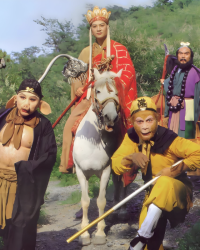
As one of the Four Great Classical Novels of China and the first romanticized long-form fantasy novel in Chinese literature, Journey to the West profoundly portrays the social realities of its time. The plot develops as Sun Wukong encounters Zhu Bajie (Pigsy), Sha Wujing (Sandy), and Tang Sanzang (Tripitaka). The narrative primarily focuses on the journey of Sun Wukong, Zhu Bajie, and Sha Wujing as they protect Tang Sanzang on his westward pilgrimage to retrieve sacred Buddhist scriptures. From his reincarnation to his ultimate success, Tang Sanzang endures 81 tribulations, battling demons and overcoming challenges along the way. The journey culminates in their arrival at the Western Paradise, where they meet the Buddha. Ultimately, the five travelers—Tang Sanzang and his disciples—achieve enlightenment and ascend to sainthood.
Latest Update
chapter2The Monkey King Receives His Name
Upon receiving his name, the Monkey King was overjoyed and full of excitement. He bowed to the Patriarch, expressing his gratitude. The Patriarch then instructed the disciples to lead Wukong outside the inner gate and teach him the etiquette of sweeping, serving, advancing, and retreating. The disciples complied and escorted him out.
Once outside, Wukong bowed to his senior brothers again and arranged his sleeping quarters under the eaves. From the next day onward, he began learning language, manners, scriptures, and meditation with his senior brothers. He practiced writing, burned incense, and adhered to this routine daily. During his free time, he swept the floors, tended the garden, nurtured flowers, pruned trees, gathered firewood, fetched water, and prepared other necessities. Time passed quickly, and before he knew it, six or seven years had elapsed in the cave.
One day, the Patriarch ascended the dais to give a lecture on the Great Dao. The lecture was nothing short of extraordinary:
Heavenly flowers cascaded, golden lotuses sprouted from the ground.
The teachings of the three vehicles were profound, encompassing the entire truth of all laws.
With a flick of the dust whisk, pearls of wisdom flowed,
echoing like thunder, shaking the heavens.
He spoke of the Dao elaborated on Zen,
harmonizing the truths of all three teachings as if they were inherently one.
Enlightening the mind to sincerity with a single word,
he revealed the mysteries of the unborn nature.
Wukong, enraptured by the teachings, couldn't contain his joy. He scratched his ears, grinned widely, and began dancing with his hands and feet. The Patriarch noticed and called out, "Wukong! Why are you acting so wildly in the middle of the lecture?"
Wukong replied, "Master, I am sincerely listening to your teachings. When your profound words touched my heart, I couldn't help but dance with joy. Please forgive me!"
The Patriarch said, "Since you understand the beauty of my words, let me ask you: how long have you been in this cave?"
Wukong replied, "Master, I was naive and did not keep track of time. However, I recall going to gather firewood behind the mountain when there was no fire in the stove. I found a peach tree there and have eaten my fill of its fruits seven times."
The Patriarch said, "That mountain is called Rotten Peach Mountain. Since you've eaten there seven times, you must have been here for seven years. What do you wish to learn from me now?"
Wukong eagerly replied, "Master, I am willing to follow any of your teachings, as long as I can acquire some of the Dao."
The Patriarch said, "There are 360 auxiliary paths under the character 'Dao,' each leading to a true result. Which one do you wish to learn?"
Wukong responded, "I will follow your guidance wholeheartedly."
The Patriarch said, "How about I teach you the path of 'Arts'?"
Wukong asked, "What is the path of 'Arts'?"
The Patriarch explained, "This path involves summoning spirits, divination, geomancy, and understanding how to avoid misfortune."
Wukong asked, "Can these practices grant immortality?"
The Patriarch replied, "No, they cannot."
Wukong firmly said, "Then I won't learn them!"
The Patriarch said, "How about the path of 'Schools'?"
Wukong inquired, "What does the path of 'Schools' entail?"
The Patriarch answered, "This path includes the teachings of Confucianism, Buddhism, Daoism, Yin-Yang philosophy, and others. It involves studying scriptures, chanting, and venerating the divine."
Wukong asked again, "Can this path grant immortality?"
The Patriarch replied, "It can, but it is like a pillar within a wall—it will eventually decay and fail to provide lasting support."
Wukong retorted, "If it's not enduring, I won't learn it either!"
The Patriarch then offered, "How about the path of 'Stillness'?"
Wukong asked, "What results does 'Stillness' bring?"
The Patriarch explained, "This involves fasting, meditation, asceticism, and abstinence. It emphasizes tranquility and retreat."
Wukong asked, "Can this lead to immortality?"
The Patriarch replied, "It is like an unfired brick—it will crumble under heavy rain."
Wukong laughed, "Master, your metaphors are clever, but I won't learn this either!"
The Patriarch continued, "Then what about the path of 'Action'?"
Wukong inquired, "What does the path of 'Action' involve?"
The Patriarch described, "It entails alchemical practices such as refining elixirs, using medicinal herbs, and pursuing physical cultivation."
Wukong asked, "Will this grant immortality?"
The Patriarch replied, "This path is like catching the moon's reflection in water. Though it appears reachable, it is ultimately an illusion."
Wukong said resolutely, "I won't learn it either!"